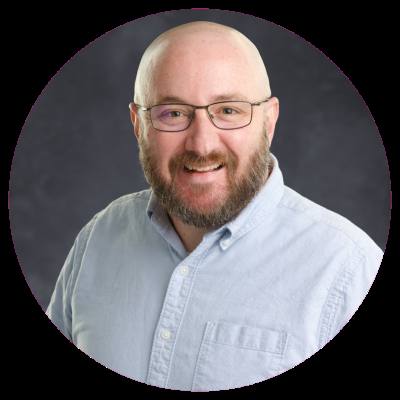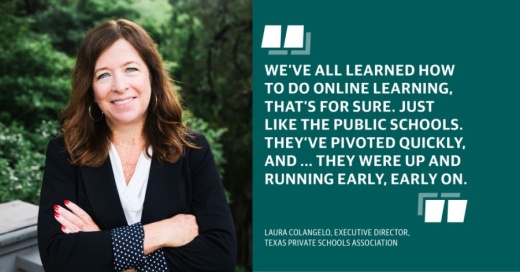Laura Colangelo, executive director of the Texas Private Schools Association, said private schools statewide have made difficult decisions, including pivoting to offer remote learning options, spending millions on personal protective equipment and seeking federal assistance to make up for declining enrollment and revenue. Some have even closed their doors.
Colangelo, a lobbyist for Texas private schools, discussed challenges private schools have faced during the pandemic and her priorities ahead of the state’s 2021 legislative session. This interview has been edited for length and clarity.
How have private schools been affected differently by the pandemic than public schools have?
Private schools are not required to follow [Texas Education Agency] guidelines because we’re private. But those guidelines TEA publishes set what’s called a standard of care for school children in Texas. So private schools need to be really careful and make sure that they are doing at least ... something similar to what the TEA is recommending for public schools. Otherwise, you risk some liability.
... So, we were kind of swept in early on in the pandemic. We were swept in with the public schools and the governor’s executive order. And then, over the summer, I worked really hard with the attorney general and the governor’s office to say ‘OK, we need to be private again. We need to go back to our normal operating procedure.’ And so another executive court order came out in June ... that took us out of sort of being regulated by the TEA because we don’t want that. We’re not public schools.
Are most private schools offering some kind of remote learning option, or are most requiring all students to be on campus?
So all private schools that I’m aware of offer a remote option for families that want it. But most ... are also open to in-person learning and have been since mid-August. I think the rest of them opened up on that Sept. 8 date. ... So that has been wonderful because, you know, we depend on tuition—parents paying tuition. And parents aren’t going to be really excited about paying tuition when school is not fully operational. ... They’ve spent a ton of money. I think about $64 million [is what] private schools have spent statewide on mitigation strategies, on cleaning and masks and gloves and all the things. The plastic separators and things that are enabling them to stay open. ... It’s worked well so far, and they’ve been able to stay open and educate kids.
How has enrollment at private schools been affected by the pandemic?
Statewide, the data we have is that enrollment is down 9%. I think that’s due to economic reasons. Now, I do think there are parts of the state where enrollment is up, and certain schools’ enrollment is up significantly. And I think that depends on whether the public schools opened or were communicating early on that they were going to open because ... nobody knew it was happening for a really long time. And I think parents got frustrated and enrolled their kids in certain private schools. But overall, enrollment is down.
Have private schools sought out Paycheck Protection Program funding or other assistance?
Many schools did seek the PPP loans, and that has been incredibly helpful, especially with all the extra money they’ve extended that wasn’t expected. You know, we weren’t budgeting for a pandemic last year when the budgets needed to be made for this year. So, yeah, they have sought that out, and a lot of them are cutting ... fundraisers. Private schools depend not only on tuition but [on] donations from fundraisers and things, and those were canceled in the spring, so they’re hurting in a lot of different ways.
What have private schools learned from coping with the pandemic?
We’ve all become health experts in the last eight months, so that was unexpected. But I think they’ve learned how important the community is. ... They’ve worked really hard to reach out, even when they weren’t allowed to be in person this summer and early before Sept. 8. So they were being more creative about keeping a community online because a lot of parents seek that out for the smaller class size and the teachers knowing your kid and that kind of thing.
So it’s been a challenge to shift it online, but they’ve done it well. And, well, we’ve all learned how to do online learning, that’s for sure. Just like the public schools. They’ve pivoted quickly, and ... they were up and running early, early on. ... It was around spring break when [the pandemic] happened, and most schools had started back online learning by the time the kids were back from spring break even though they couldn’t be in the building. ... We’ve learned how to be flexible and, you know, make some hard decisions and do it well.
What are your priorities for the state’s 2021 legislative session?
Two things. One, we passed a do-not-hire list last session that is a database of teachers that have had inappropriate relationships with students. These are both public and private school teachers. So that was a big victory last session, and I’d like to sort of improve on that next session if possible. ... Right now, it’s teachers, administrators, librarians and counselors. I would like to expand it to coaches, janitors, school bus drivers and anyone who’s around children.
... The second one is immunity from liability for COVID-related claims because private schools, unlike public schools, [which] have sovereign immunity—we can be sued. And so I think a lot of businesses and nonprofits are interested in this as well. [They] will be part of the stakeholder group on [the] immunity-from-liability bill that goes through the Legislature.





